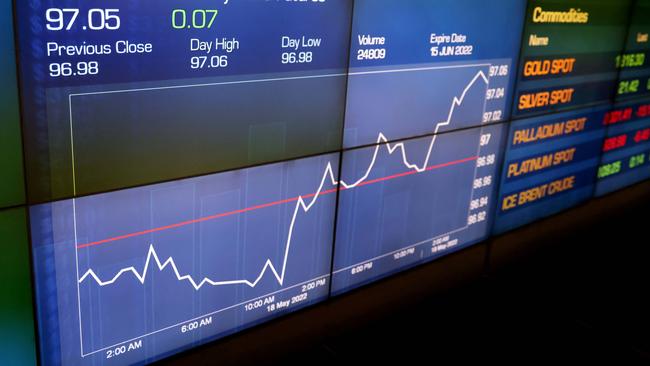Stocks are taking off again so does this make sense and are you missing out?
A lift in markets both here and abroad is catching attention from mainstream investors, but the rally is built on little evidence of better times.

The irony about sharemarkets is that the more share prices rally, the more optimistic we all become, and the stronger the urge to join in and become part of that rally.
But as one astute market follower stated last week, such a reflex makes a lot more sense when the S&P 500 is below 3900 – where it was late last year or in February – than it does when the index is where it is now which is near 4388.
We all can come up with reasons as to why equities globally are back in rally mode. You might simply observe that the number of investors and commentators willing to call a new bull market is steadily rising on Twitter.
I would not be surprised if we’re all about to find out that institutional fund managers have been reducing their cash holdings while hedge funds have decided to cover short positions.
My suspicion is based upon the data from S&P Global Market Intelligence showing those global institutions have been gradually, but persistently, reducing exposure to US equities during the 12 months to May 31.
Over that period, the S&P 500 has effectively gone nowhere as each attempt to rally ran into subsequent weakness.
Has this dynamic changed over the past weeks?
For a professional fund manager, nothing is as devastating as seeing markets rally while sitting with loads of cash on the sideline.
As we have all witnessed over the past 18 months, there is always room for surprise.
The Federal Reserve is partially responsible too. Not because of “the pause”, which is being interpreted positively, but because of the central bank’s ongoing injections of additional liquidity in the US financial system.
Jerome Powell and co are worried about further fallout and economic consequences from the regional banking crisis and are providing extra liquidity in support of US banks.
My worry about US markets is still the same: if forward-looking indicators, backed by historical parallels, are correct then corporate profits for US companies are facing more (not less) downward pressure in the quarters ahead.
The dynamics for Australian equities are not quite the same this year. Local indices have booked much smaller gains.
As the S&P 500 has put on nearly 15 per cent, the ASX has gained about 5 per cent, although our market has been carried by a significantly broader participation.
In line with the toughening conditions for companies generally, “corporate confession season” is making a comeback, after a hiatus of two to three years. And as witnessed by the disappointing market update by lithium play Lake Resources (LKE) on Monday, it’s not simply all about households minding the pennies.
Consumer confidence and changing spending behaviour will likely remain at the forefront of investors’ attention for a while longer. Not only are companies such as Adairs (ADH), Baby Bunting (BBN), City Chic (CCX), Domino’s Pizza (DMP), Retail Food Group (RFG), Treasury Wine Estates (TWE) and Universal Store (UNI) issuing disappointing operational updates, sector analysts are increasingly suggesting this won’t be a short process, implying risks may well extend beyond FY24.
Nonetheless, more than half of the ASX 200 carried the index versus 20 major winners for the S&P 500. But … my concern is exactly the same. The present rally is pushing the local market’s PE ratio above its long-term average … while analysts are busy downgrading forecasts.
Analysts at Macquarie have warned the wave of downgrades is about to hit corporate Australia at large given that the latest NAB Business Survey revealed the value of orders received is falling across Australia. Reports from Macquarie also points out that negative orders are a reliable signal that conditions overall could turn negative within a few months.
The key words for the months ahead, suggests Macquarie, is margin pressure. Declining orders means businesses that are still facing inflation (and other pressures) can no longer simply pass these on to customers. The more vulnerable might need to offer discounts instead, with even larger impacts on margins.
Highly regarded CSL (CSL) last week, and multinational Amcor (AMC) the previous month, have shown even the more defensive business models can be affected. Healthcare companies in general have found the process towards normalisation post-Covid a lot more challenging, both for previous winners and losers from the pandemic.
Investors will note similar challenges have held back share prices for ResMed (RMD), Ramsay Health Care (RHC), Fisher & Paykel Healthcare (FPH), Sonic Healthcare (SHL), Healius (HLS) and many of the smaller operators in the sector.
Meanwhile, analysts at Jarden met with more than 30 companies recently. On their assessment, the best placed in a domestic sector under duress are Costa (CGC), Breville (BRG), Coles (COL), Wesfarmers (WES) and Woolworths (WOW). Those worst positioned, and thus most vulnerable to further downward pressures, include Adairs, Accent (AX1), The Reject Shop (TRS), Kogan (KGN), and Universal Store.
It is true, the sharemarket does not equal the local economy. But at some point the economy and share prices will converge.
The greater the gap between the two, the larger the readjustment needs to be.
Rudi Filapek-Vandyck is the editor at share market research service www.fnarena.com.



To join the conversation, please log in. Don't have an account? Register
Join the conversation, you are commenting as Logout